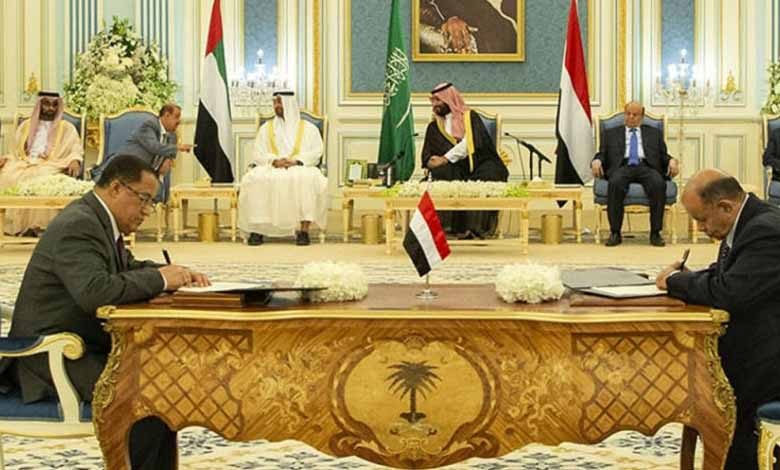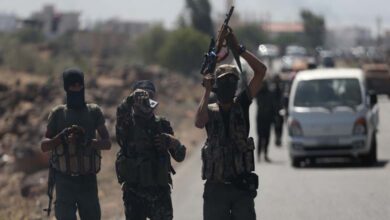Al-Houthi, The Brotherhood, and Terrorism.. Triple seeks to spoil Riyadh agreement

Terrorist organizations and Houthi militias have expanded their operations in southern Yemen following a Saudi call to the two sides of the Riyadh Agreement to complete the implementation of the agreement through treacherous attacks in Aden and Abyan.
It seems that Al-Houthi and the Brotherhood and their terrorist cells felt the danger of the Saudi-led coalition moving to complete the implementation of the Riyadh Agreement, which revived the hopes of Yemenis, so that these terrorist groups may launch the Durons, carry out the bombings, and move the “Al-Qaeda” card to a brutal and heinous attack on Yemeni security and civilians.
Saudi Arabia dealt a heavy blow to Houthi militias after they intervened to consolidate the solidarity of the anti-coup camp front and called on the two sides of the “Riyadh agreement” to meet urgently to complete the implementation of the remaining points of the agreement that will unite all forces against Iranian-backed rebels.
The two parties to the Riyadh agreement committed the Yemeni government and the Transitional Council to complete the implementation of the agreement, including the formation of the joint negotiating delegation and the security and military file.
The Houthi militias realized that the step of completing the Yemeni agreement will put a real end to their war and coup, and they deliberately launch night-long guided planes to spread terror among the population in the interim capital Aden.
Her joint paper with the Brotherhood, represented by Al-Qaeda, also sparked a bloody attack that killed 12 soldiers and civilians and wounded others.
Simultaneously, these terrorist groups attempted to assassinate Minister of Civil Service and Insurance, Dr. Abdel Nasser Al-Wali, in a terrorist bombing to mix cards, as he is one of the most prominent ministers of the transitional council in the government of qualified individuals formed in accordance with the Riyadh Agreement.
The Southern Transitional Council condemned these terrorist operations and instructed its forces to raise the level of preparedness and vigilance against terrorist groups in Aden, Abyan and all southern provinces.
Ali al-Kathiri, official spokesperson for the Southern Transitional Council, said the council, facing a new and dangerous plan aimed at abolishing its role, confirms that the plan will fail and will remain vigilant against terrorist groups and their supporters, and will not hesitate to protect its people from their hatred and criminality.
In a statement, al-Ain al-Ekhbariya reviewed a copy of the statement by his brothers and friends, and called on the Arab, regional and international coalition to combat terrorism to provide the necessary support to continue “our joint war against terrorism and its groups, and to cleanse Aden and the south in general of its criminal cells”.
Riyadh agreement is necessary to defeat al-Houthi
Any observer sees the common impressions and aspirations of broad sectors of the Yemeni population, which are united against the rejection of the killing machine of the Houthi militias as the main enemy that destroyed the country’s future.
Similarly, Yemenis reject Brotherhood ambitions in the south, which share a new wave of escalation by the Houthis to create challenges and obstacles to the failure of the Yemeni government to achieve its program of work by drying up financial resources and state institutions as an umbrella for corruption and disrupting life in liberated areas.
According to political analyst Jamal Abdul Ghani, completing the implementation of the “Riyadh Agreement” does not only deal a painful blow to the Brotherhood, but also provides a valuable opportunity, strengthens the Yemeni army and joint resistance on the fronts of Marib, al-Hodeidah, Hajjah, al-Dali and Taiz to defeat the Houthi militias, which have become almost incapable of achieving any success.
The recent collapse of Houthi militias has made many voices, whether partisan or popular, louder than Hawthi rebellion, he said. It has also led to the fall of the Hawthi rebellion by the leadership of al-Sharia and the coalition to move the rest of the fronts, and the declaration of withdrawal from the Stockholm agreement to mobilize the specific forces that are there and liberate the rest of al-Hodeidah.
The latest US positions announced recently by the new administration have also become prominent, he said, adding that it is important to accelerate the implementation of the remaining articles of the Riyadh agreement as a necessity to prevent the dismemberment of the front represented by the majority of Yemeni anti-Houthi parties.
Abdul Ghani believes that Saudi Arabia, which leads the coalition by calling on the Yemeni parties, feels all of this well. Its move is considered a real revival of the Riyadh Agreement and has become a decision to resolve the battle against the Houthi militias, as the agreement unites all forces towards the fronts.
At the same time, the end of the Houthi coup puts an end to Brotherhood schemes, and the manipulation of the military file by the organization’s leaders on the fronts of war and inside liberated areas, as recent terrorist operations have served regional parties that oppose the Arab project in the region, according to the political analyst.
Ground translation
The Riyadh Agreement is a national track that aims to overcome the differences of anti-Houthi forces and complete the implementation of its provisions. It has become necessary to unify the internal judiciary and strengthen the military and security front in the face of challenges and organized cross-border terrorism.
The timing of Saudi Arabia’s call and the welcoming of the signatories of the “Riyadh agreement” are crucial as it is a basis for Yemenis to agree on a comprehensive political solution and a key to the international community to end the war and save the country from an imminent humanitarian catastrophe.
Al-Maqtari told Al-Ain News that the government and the transitional council’s welcome of the Saudi call needs to translate a necessary process for these declared positions. There is no need for further delay in completing the remaining provisions of the Riyadh agreement.
The completion of the “Riyadh agreement” will open new avenues for the government to address the living and service conditions of the people, and will lead to the normalization of life in the liberated provinces based on the outputs of the other articles of the agreement, and end the conflict between the security and military decisions, according to the Yemeni politician.
He said that the conclusion of the agreement represents the last chance to unite Yemeni forces in the face of the Houthi coup. Any failure of this agreement, God forbid, will have grave consequences, and militias will use terrorist cells, ballistic missiles, and guided planes to liquidate their opponents one by one until they control all of Yemen.
It is clear that there are those who do not want the Riyadh agreement to complete the implementation of its provisions, especially the military and security aspects. According to Al-Maqtari, whenever Aden experiences a kind of stability, we see attempts to drag it into chaos, as the stability of the capital does not serve the projects of these parties.
The Yemeni leader explained that these parties are mobilizing to the south and at times trying to sow unrest and cheer their media for the explosion or a minor disorder there. This inconvenience is added to the suffering of official media, and even the spread of the poisons of division and accusations to serve one party within the legal system.












